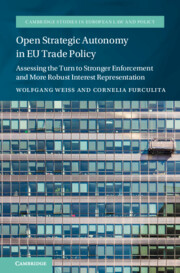 Open Strategic Autonomy in EU Trade Policy
Open Strategic Autonomy in EU Trade Policy An Attempt to Rescue the WTO Dispute Settlement
from Part II - The Tools for Stronger Enforcement of Trade Rights
Published online by Cambridge University Press: 29 November 2024
As the EU seeks to continue reaping the benefits of multilateral trade and to restore and reform the WTO dispute settlement mechanism, Chapter 4 focuses on the EU-led alternative created for the appellate stage: the Multi-Party Interim Appeal Arbitration Arrangement (MPIA), which ensures that its parties can continue using the two-stage WTO dispute settlement mechanism without panel reports being sent into the void by regular appeals. The chapter introduces the pertinent WTO rules and the MPIA and assesses the arrangement’s compliance with the former. To ensure that the MPIA can indeed live up to EU’s ambition to ensure assertive enforcement of multilateral trade rights, it evaluates whether the MPIA is likely to provide security, predictability, and high-quality rewards while also helping to unlock the WTO dispute settlement crisis. Then, the chapter assesses whether the MPIA could be blocked by an unwilling party, thereby jeopardizing the operation of the MPIA. Finally, to be able to weigh in on the ability of the MPIA to contribute to solving the crisis or rather to undermine the WTO multilateral system, it considers the MPIA’s broader geopolitical implications.
To save this book to your Kindle, first ensure no-reply@cambridge.org is added to your Approved Personal Document E-mail List under your Personal Document Settings on the Manage Your Content and Devices page of your Amazon account. Then enter the ‘name’ part of your Kindle email address below. Find out more about saving to your Kindle.
Note you can select to save to either the @free.kindle.com or @kindle.com variations. ‘@free.kindle.com’ emails are free but can only be saved to your device when it is connected to wi-fi. ‘@kindle.com’ emails can be delivered even when you are not connected to wi-fi, but note that service fees apply.
Find out more about the Kindle Personal Document Service.
To save content items to your account, please confirm that you agree to abide by our usage policies. If this is the first time you use this feature, you will be asked to authorise Cambridge Core to connect with your account. Find out more about saving content to Dropbox.
To save content items to your account, please confirm that you agree to abide by our usage policies. If this is the first time you use this feature, you will be asked to authorise Cambridge Core to connect with your account. Find out more about saving content to Google Drive.